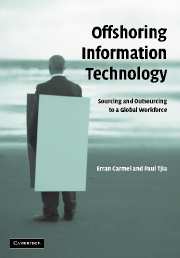Book contents
- Frontmatter
- Contents
- List of contributors
- Foreword
- Preface
- Acknowledgments
- Part I The fundamentals
- Part II Managerial competency
- 5 Offshore strategy
- 6 Offshore legal issues
- 7 Managing the offshore transition
- 8 Overcoming distance and time
- 9 Dealing with cross-cultural issues
- Part III Other stakeholders
- References
- End notes
- Index
5 - Offshore strategy
from Part II - Managerial competency
Published online by Cambridge University Press: 11 August 2009
- Frontmatter
- Contents
- List of contributors
- Foreword
- Preface
- Acknowledgments
- Part I The fundamentals
- Part II Managerial competency
- 5 Offshore strategy
- 6 Offshore legal issues
- 7 Managing the offshore transition
- 8 Overcoming distance and time
- 9 Dealing with cross-cultural issues
- Part III Other stakeholders
- References
- End notes
- Index
Summary
Offshoring has become the management fad of the moment; the innovation du jour; the accepted reaction to cost pressures; or before 2000, during the technology boom, the reaction to labor shortages in industrialized nations.
Does any of this constitute a strategy?
In order to begin answering this question, the notion of “offshore strategy” needs to be qualified for each company. It needs to be seen in a broader context and not in isolation. First, for medium- and large-sized companies, offshoring is part of a broader globalization strategy. Second, also for medium- and large-sized companies, offshoring IT is just one part of the larger scope of knowledge and service activities that companies source globally, along with IT-enabled services (ITES) and research and development (R&D) of all kinds. Thus, strategic offshoring is, but, part of an overall sourcing strategy which deals with the portfolio of strategic options: whether these options be at home, abroad (in both high-wage and offshore nations), inside the company, outside the company (outsourcing), and through various collaborations.
Accordingly, an exacting definition of IT offshoring strategy:
The proactive logic, evident to an outsider, in a firm's portfolio of IT offshoring activities within the firm's larger scope of global sourcing.
Admittedly, few companies take such a holistic view of their offshoring strategy. Most companies offshore with a more isolated set of goals, and with a shorter time horizon, in an evolving, or even reactive strategy.
- Type
- Chapter
- Information
- Offshoring Information TechnologySourcing and Outsourcing to a Global Workforce, pp. 93 - 111Publisher: Cambridge University PressPrint publication year: 2005



